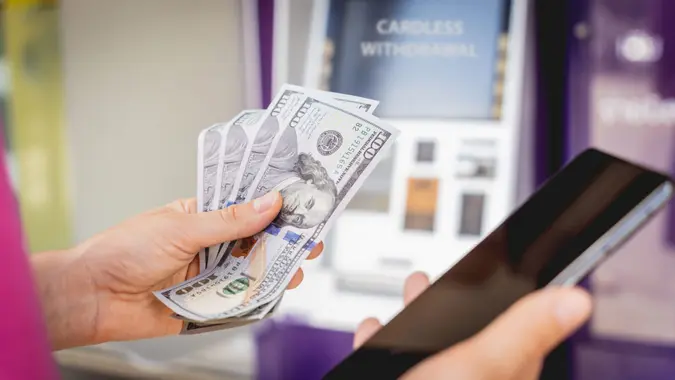Cash-Only Weekend: How This Challenge Can Help You Save

Commitment to Our Readers
GOBankingRates' editorial team is committed to bringing you unbiased reviews and information. We use data-driven methodologies to evaluate financial products and services - our reviews and ratings are not influenced by advertisers. You can read more about our editorial guidelines and our products and services review methodology.

20 Years
Helping You Live Richer

Reviewed
by Experts

Trusted by
Millions of Readers
In 2025, everything seems to be more expensive than ever before, and in many cases, it’s true. Since January 2022, all food prices have gone up by 17.3%. The median price of a home in the U.S. is now $459,826 with a 30-year mortgage rate of 6.5%, which is unaffordable for nearly 75% of households. In order to save, people are coming up with new ways to manage their money. One new trend is aiming to reduce credit card spending.
Credit card spending makes it easy to spend more than you intended because all you need to do is tap your card and deal with the consequences down the road. But if you don’t have the funds to pay off your credit card right away, you’ll pay a lot more with added interest. The current average APR for general-purpose cards is 24.62%, which adds up quickly over time. To combat this excess spending, many are trying out cash-only weekends.
What Is a Cash-Only Weekend?
In the digital age, it might not be trendy to carry cash around anymore, but it can be an effective way to save money. A cash-only weekend is exactly what it sounds like. You predetermine how much you’ll allow yourself to spend over the course of a weekend, head to the nearest ATM and withdraw that exact amount of cash. Alternatively, you can set spending limits on your debit card or mobile wallet.
When you set your limit, be intentional about choosing the right number. You don’t want to end up having much less than you actually need for the weekend or spending a lot more than you should. Carefully budget for what your weekend plans involve. Think about any groceries you may need to buy, transportation costs like gas or ride sharing, activities and whatever else you need.
You should also consider how much you’re hoping to save and how this fits into your larger monthly budget. If you have debts, determine how much weekend savings you’re generating and put those toward your principal loan amounts or credit card balances. If you have savings goals, such as building an emergency fund or saving for retirement, calculate how much you could spend on a weekend while saving enough for those goals.
Why a Cash-Only Weekend Works
Cash-only weekends work similarly to envelope budgeting systems. To use an envelope system, you need to calculate your monthly expenses, including your fixed costs, savings goals, debt payments and retirement account contributions. Subtract everything from your total income except for your spending money.
You then withdraw your spending money in cash and put it into envelopes. Label each envelope with the spending category, such as groceries, eating out and transportation. Over the month, you’ll use the cash in these envelopes to stick to your budgeting plan. Once you run out of money in a category like eating out, you won’t be able to go out to eat anymore. However, you’ll still have to think about how you’re depleting those envelopes throughout the month. You don’t want to run out of grocery money halfway through, and you might ultimately need to move some of the cash from the fun budget to the necessities budget.
The cash-only weekend works in a similar way. When you’re out of cash, you’re out of money until Monday. This not only motivates you to spend carefully over the weekend, but it also makes you more aware of how you’re spending your money. Holding physical cash in your hand and giving it away makes a transaction feel much more real than simply swiping or tapping a card.
After trying a cash-only weekend or two, take a look at your finances and see if they are improving. Specifically look at your debts and savings and see if there is a noticeable difference. If not, you may want to reanalyze your weekend spending and look for even more ways to cut back.
 Written by
Written by  Edited by
Edited by 
























